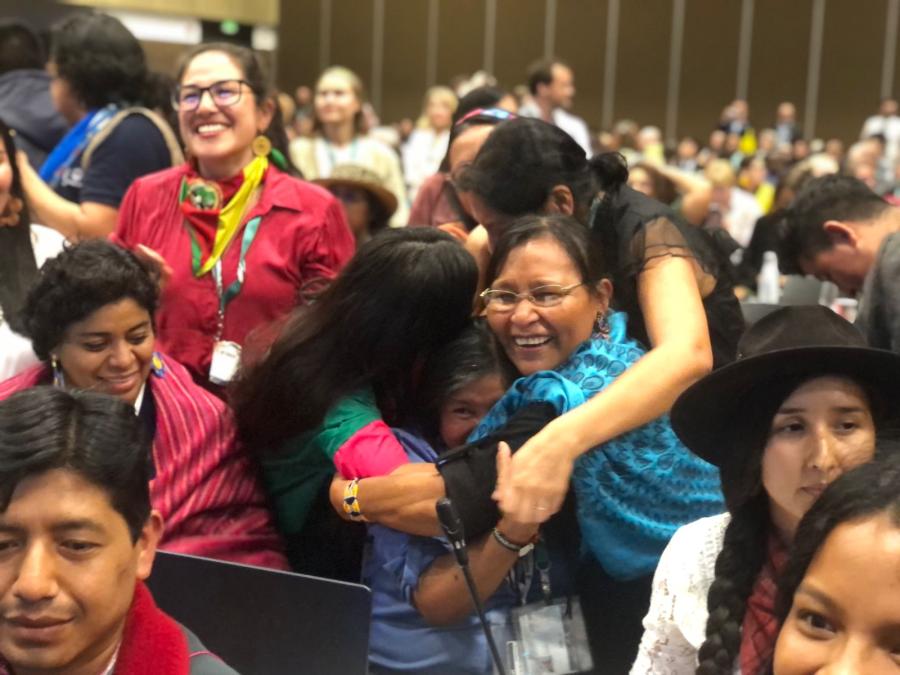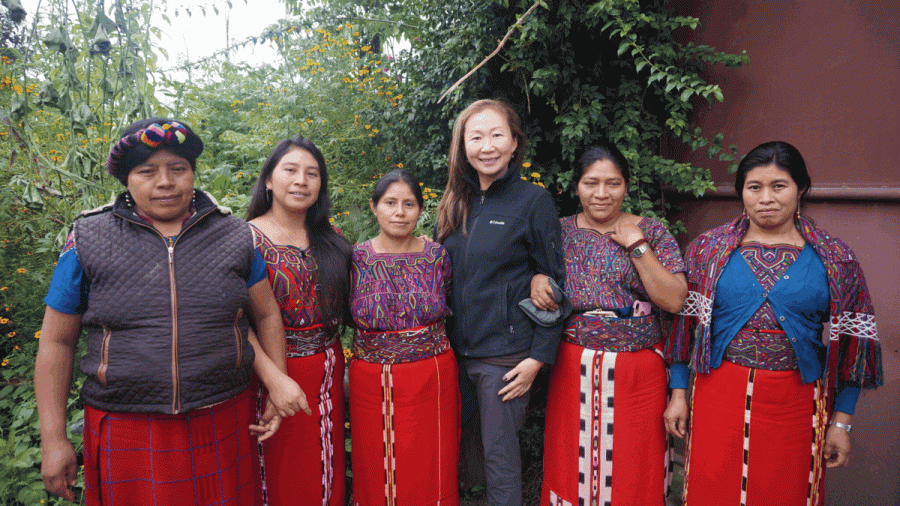
By Bryan Bixcul (CS Staff)
It’s been almost 30 years since the first UN Framework Convention on Climate Change Conference of the Parties (UNFCCC COP) in 1995, yet greenhouse gas emissions have continued to rise every year. Fossil fuels are poisoning everything around us. There is a reason why Mother Earth has kept these elements trapped within her depths. At UNFCCC COP28, held November 30–December 12, 2023, in Dubai, the world spoke in one voice, calling for an end to fossil fuels. However, the power of big oil companies with access to closed-door sessions and petrostates influenced the outcome document of the first Global Stocktake.
The first Global Stocktake concluded what we already knew: participating countries are not collectively on track to achieve the purpose of the 2015 Paris Agreement, which aimed at limiting global warming to well below 2°C above pre-industrial levels, and ideally limiting the temperature increase to at most 1.5°C above pre-industrial levels to reduce the risk and impacts of climate change. At the same time, the 2021 Sixth Assessment Report of the Intergovernmental Panel on Climate Change found that human activity, mainly through greenhouse gas emissions, has already caused global warming of about 1.1°C, and that limiting global warming to 1.5°C would require cutting greenhouse gas emissions by 43 percent by 2030 and 60 percent by 2035, relative to 2019 levels.
The Global Stocktake outlines the goal of “[transitioning] away from fossil fuels in energy systems in a just, orderly and equitable manner, accelerating action in this critical decade, so as to achieve net zero by 2050 in keeping with the science.” This is the best metric the world could achieve in the Global Stocktake when addressing the main cause of global warming, though it lacks any meaning when, for example, the United States, the largest oil and gas-producing country in the world, is currently breaking production records. The dearth of language around the need to phase out fossil fuels is proof of the immense power that oil companies hold. Worryingly, the agreement promotes false solutions that do not cut emissions at source, such as abatement and removal technologies like carbon capture and utilization and storage. During the conference, It was almost impossible to escape, both in the streets and online, ExxonMobil ads promoting carbon capture services and so-called “clean energy from hydrogen.” Translation: they get to continue polluting the Earth and then charge us for cleaning it.
Humankind has never had at any point in history the wealth of accumulated knowledge and capacity that we do now, and yet we are failing at the most basic of tests—the one of survival. Though the COP28 presidency touted the agreement of transitioning away from fossil fuels in the Global Stocktake as a success, it is nothing short of an epic fail. How can we be expected to applaud almost 30 years of inaction? We are barely walking at a time when we need to be running.
Tripling renewable energy capacity globally and accelerating the reduction of vehicle emissions through the development of infrastructure and rapid deployment of zero and low-emission technologies are also on the menu for how to limit global temperature rise to the ultimate goal of well below 2°C. In the meantime, we can expect an increase in mining for minerals needed for the transition as countries ramp up the deployment of renewable energy technologies and electric vehicles. We can also expect an increase in greenhouse gas emissions, as it is estimated that the mining industry has been responsible for 10 percent of global greenhouse gas emissions.
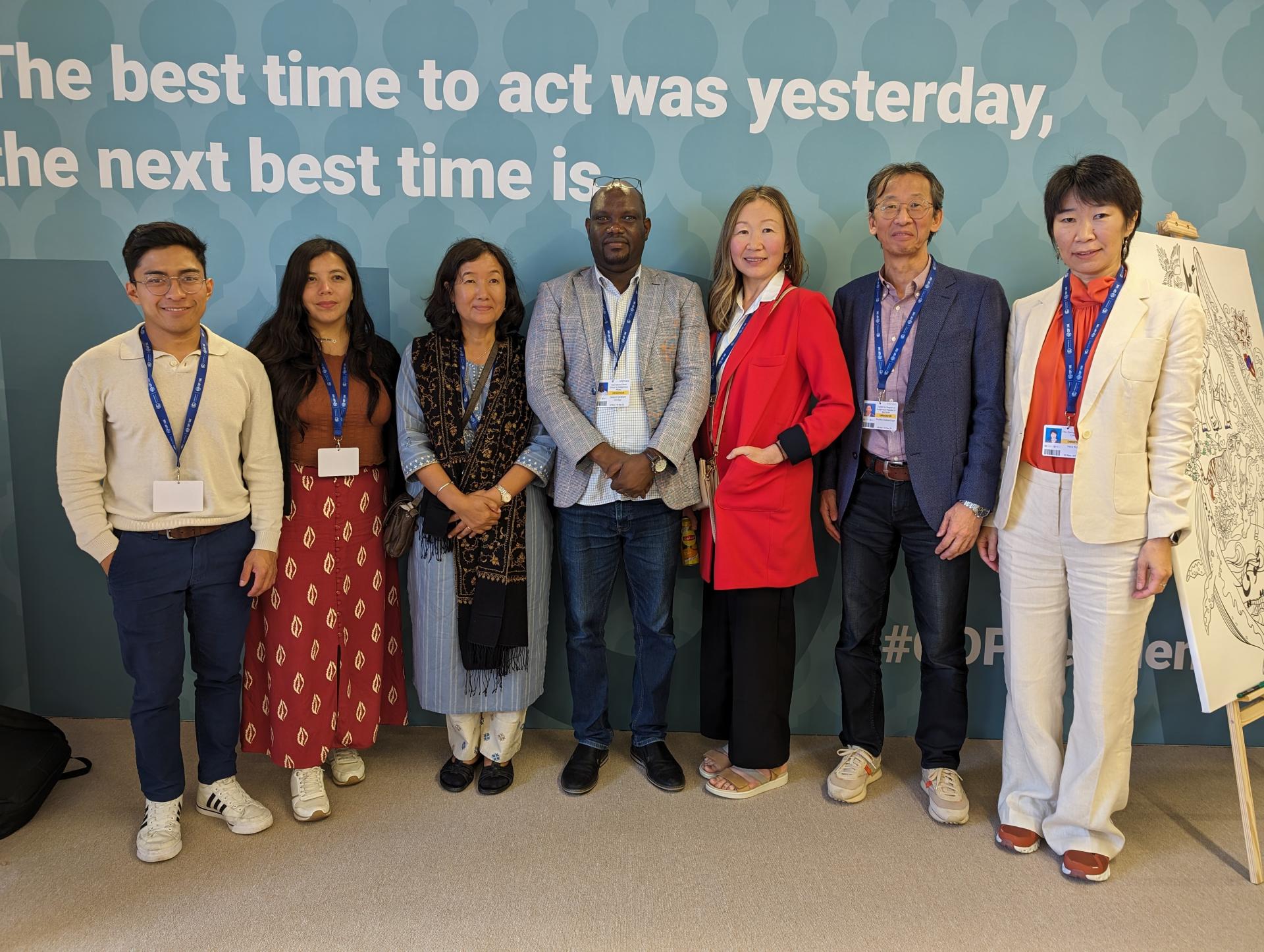
L-R: Bryan Bixcul (Maya-Tz'utijil), Lesley Munoz (Colla), Pasang Dolma Sherpa (Sherpa), Gideon Sanago (Maasai), Galina Angarova (Buryat), Rodion Sulyandziga (Udege) and Vera Kuklina (Buryat). Speakers for the panel Securing Indigenous Peoples Rights in the Green Economy: Learning From Past Mistakes.
A study published in Nature found that of 5,097 mining projects globally that involve some 30 minerals used in renewable energy technologies, 54 percent are located on or near Indigenous Peoples' lands and territories. In Africa, that number is as high as 75 percent. Indigenous Peoples’ lands span nearly one-quarter of the world’s terrestrial surface and contain 80 percent of the world’s remaining biodiversity. These lands also contribute to innumerable and invaluable ecosystem functions, such as carbon sequestration, for the benefit of the world. So, how do we make sure that the proposed medicine doesn’t also become poison? The answer is that the Just Transition was never designed for Indigenous Peoples. Our lands have been sacrificed in the name of the fossil fuel economy for the last 100 years, and we can predict that the same will continue in the so-called green economy. In fact, we are already seeing it. Strict policies and regulations must be put in place to ensure the implementation of the rights of Indigenous Peoples as prescribed in the United Nations Declaration on the Rights of Indigenous Peoples, including the right to Free, Prior and Informed Consent in all Just Transition efforts that impact the lives of Indigenous Peoples.
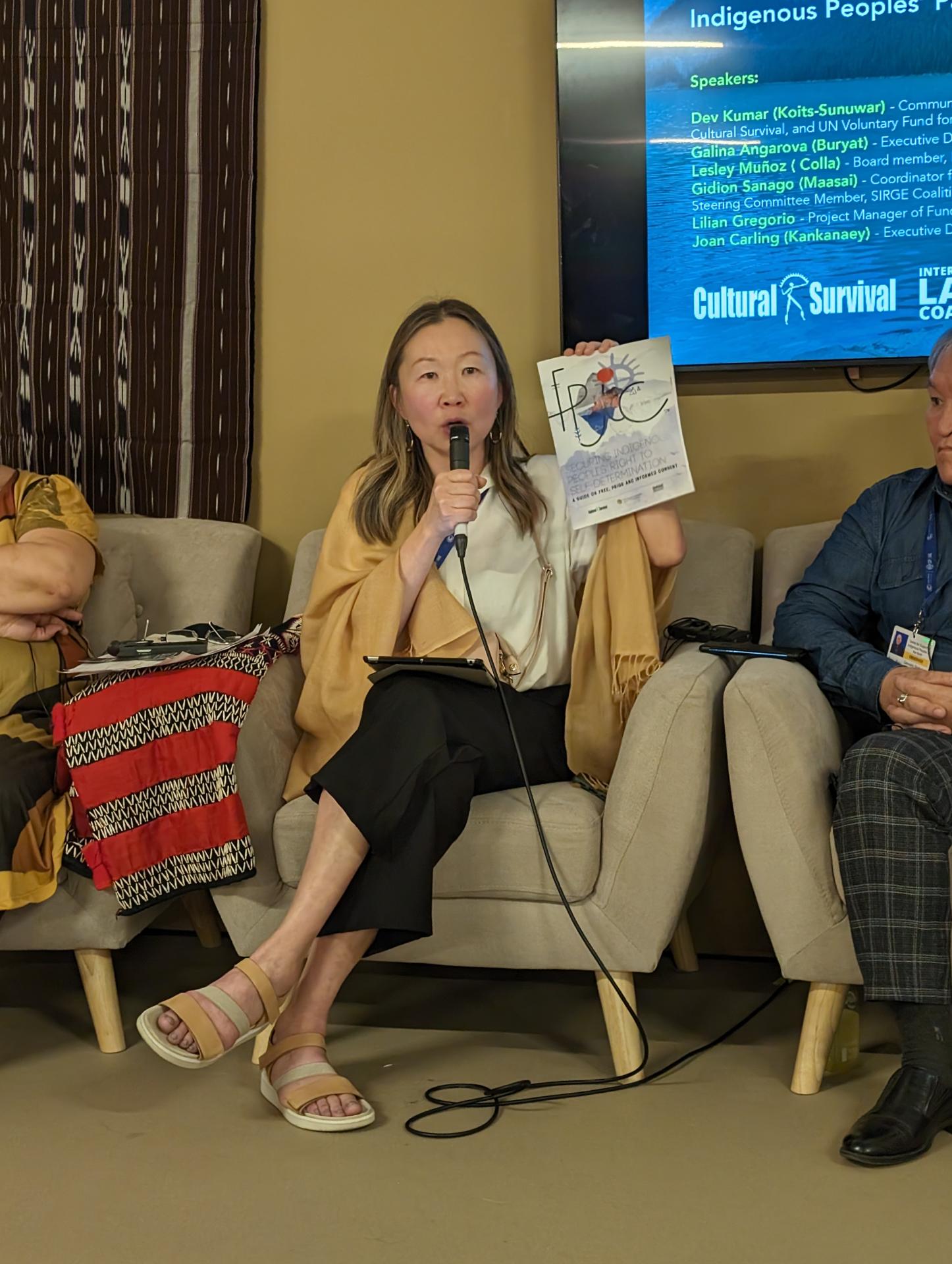
Galina Angarova, Executive Director of Cultural Survival presents Securing Indigenous Peoples Rights to Self-Determination: A Guide on Free, Prior and Informed Consent.
All over the world, we are seeing an increase in mining for transition minerals. In Chile, the second largest producer of lithium, mining activity is impacting water systems, causing biodiversity loss and violating Indigenous rights. In Argentina, many more projects to extract lithium have been proposed, and investment is flowing faster than regulations are being updated. In the United States, there is huge pressure to scale up copper, nickel, and lithium mining and to fast-track permits. In Indonesia, there is a massive increase in proposed and active nickel mining projects as large U.S., European, and Asian carmakers are signing contracts with Indonesian producers and governments. All of these cases have something in common: they lack proper processes to obtain the Free, Prior and Informed Consent of impacted Indigenous communities. Consequently, human rights violations are occurring and entire ecosystems are suffering.
“Transition is inevitable, justice is not. So, we have to make justice a central part of this transition. Otherwise we will be doing business as usual,” said Galina Angarova (Buryat), Executive Director of Cultural Survival, commenting during a panel focused on the role of the banking sector in the Just Transition. “Indigenous leadership and stewardship cannot happen with the status quo, which continues to provide less than one percent of nature and climate finance [to Indigenous Peoples]. This number is disproportionate, with Indigenous Peoples playing a crucial role in managing 80 percent of the world’s biodiversity. The real solution for biodiversity conservation and climate change mitigation and adaptation is supporting Indigenous Peoples’ self-determination.”
Just as COP28 lacked any meaningful commitment to a transition away from fossil fuels, there were no important changes on climate financing for Indigenous Peoples, either. The $700 million pledged for the Loss and Damage Fund by countries most responsible for climate change pales in comparison to the estimated $400 billion in loss and damage as a result of climate change impacts experienced by developing countries every year. Wealthy countries that contribute the most to climate change are three years overdue to fulfill their commitment of mobilizing $100 billion annually in climate finance for low and middle income countries.
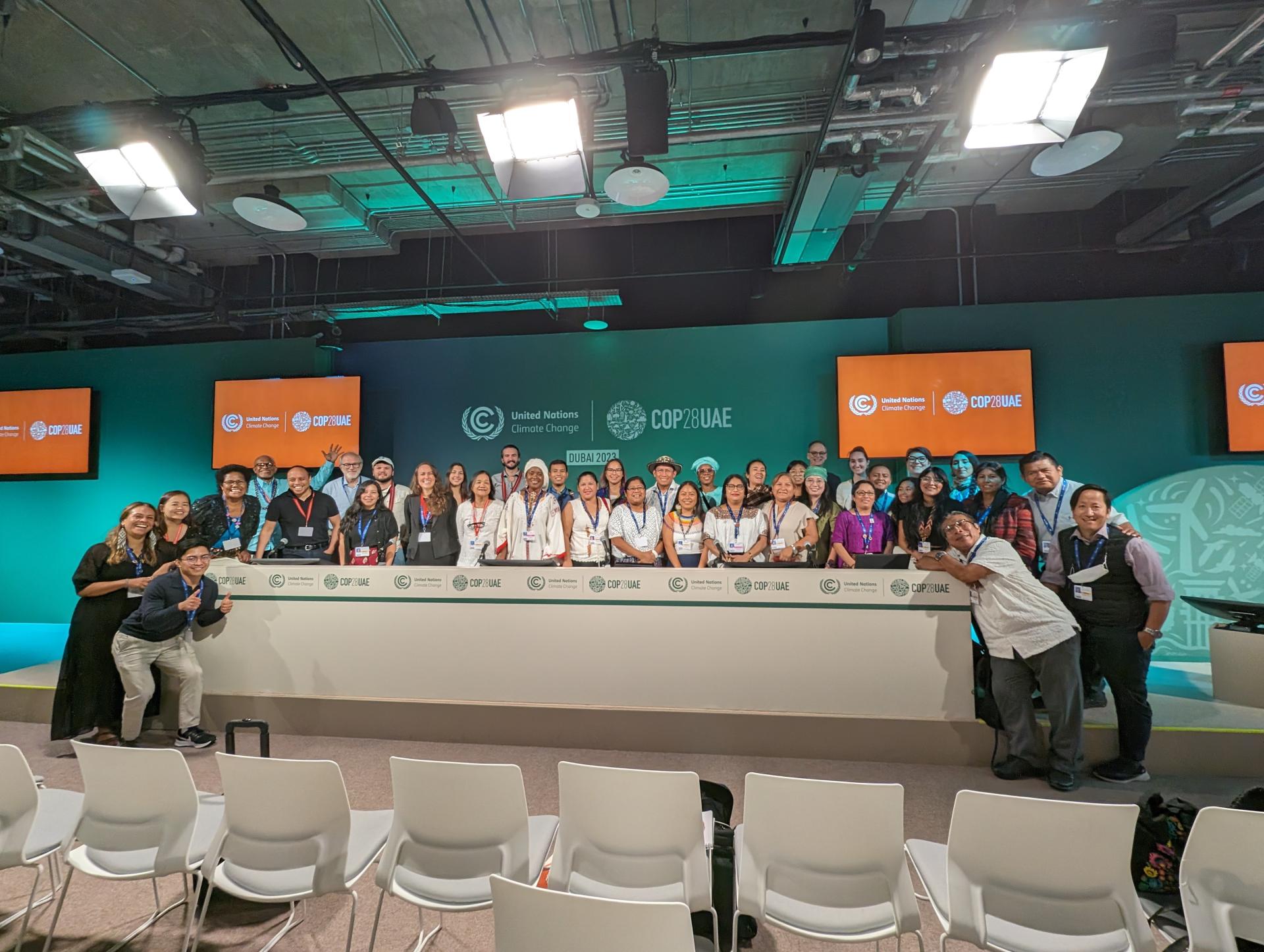
Final meeting day of the Indigenous Caucus at COP28.
Indigenous Peoples are currently receiving less than one percent of all climate financing. The majority of climate financing goes through intermediaries who have their own interests, which often do not align with the interests and rights of Indigenous Peoples. The best strategy for climate mitigation and adaptation is supporting Indigenous self-determination, which in practice means investing in Indigenous leadership through Indigenous-led organizations, Indigenous governments, and Indigenous-led Funds. Multilateral funding mechanisms should stop treating Indigenous Peoples as a high risk investment and grant them direct and simplified access to funding.
Carbon markets, as established in Article 6 of the Paris Agreement, were also at the center of discussions at COP28. This mechanism has been under scrutiny since its creation because it lacks transparency and has been used to justify violations of Indigenous rights. There was no deal reached between countries demanding the availability of carbon markets and those urging for transparency. As Ghazali Ohorella, an Alifuru representative, said to us, “No deal is better than a bad deal.” The majority of carbon credits are nature-based, such as forest protection and restoration. In many cases, carbon market initiatives involve the establishment of protected areas that restrict Indigenous Peoples' access to their ancestral lands, waters, territories, and resources. Most of the time, this is done without obtaining their Free, Prior and Informed Consent. (Listen to our interview with Ghazali Ohorella for an in-depth conversation about Article 6.)
Leaving Dubai, we can’t help but wonder what a different world this would be if humanity were valued more than profit, if nature were awarded its inherent rights and not just treated as a commodity. Although we are angry and disappointed, we must continue this fight. In the face of injustice and inaction, Indigenous Peoples do what we've always done: we resist. We deepen our relationships with Mother Earth, and we defend her. We share our wisdom with the world, we speak our Indigenous languages, and we tell our stories in hopes that one day, the Earth will be seen for what it is: the most precious being that ever existed and who is deserving of all our love and respect.
Top photo: Indigenous women march for zero emissions and just equitable funding for women on Indigenous Women's Day at COP28.
Read: International Indigenous Peoples Forum on Climate Change (IIPFCC)'s Closing Statement at COP28.

